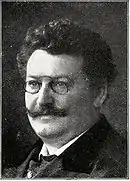Richard Bruno Heydrich
Richard Bruno Heydrich (23 February 1865 – 24 August 1938) was a German opera singer (tenor), and composer. He was the father of SS-Obergruppenführer Reinhard Heydrich, an architect of the Final Solution, and Heinz and Maria Heydrich.
Richard Bruno Heydrich | |
|---|---|
 | |
| Born | 23 February 1865 |
| Died | 24 August 1938 (aged 73) near Dresden, Nazi Germany |
| Nationality | German |
| Occupation | musician |
| Known for | founding Halle Conservatory[1] |
| Spouse(s) | Elisabeth Anna Maria Amalia Krantz (died 1946) |
| Children | Reinhard Heydrich Heinz Heydrich Maria Heydrich |
Early career
Heydrich was born in Leuben, the son of Karl Julius Reinhold Heydrich, a piano builder. He was a contrabassist in the Meiningen Court Orchestra and Dresden. In Weimar, he began his career as a singer. He was also a member of the Men's Association Schlaraffia.[2] In 1895, he sang the title role in the premiere of Hans Pfitzner's first opera Der Arme Heinrich. The young Pfitzner could find no one for the role. Heydrich made the offer to perform free of charge once a stage had been found.
Composer
Heydrich composed choral works, songs, orchestral works and operas in the style of Richard Wagner, which were performed in Cologne and Leipzig. These works never entered the standard repertoire. Heydrich left behind about 83 compositions. In 1899, he founded a music conservatory in Halle an der Saale which bore his name.
Personal life
Heydrich's wife Elisabeth, née Krantz, came from a wealthy family and was the daughter of Eugen Krantz, the head of the Royal Conservatory of Dresden. She met Richard Bruno Heydrich when he was a student at the conservatory. In Halle an der Saale, Richard Bruno Heydrich, Elisabeth, and their children lived in a second floor apartment, Gütchenstraße 20. Richard Bruno Heydrich’s eldest son, SS General Reinhard Heydrich (1904–1942), was named after the hero of his first opera, Amen. Heinz Heydrich, Reinhard's younger brother, committed suicide in 1944.[3]
Richard Bruno Heydrich died at a spa near Dresden, where his death certificate was issued.[4] His crypt is in the Stadtgottesacker, Halle an der Saale.
Works

Chamber music
- Klaviertrio op. 2
- Streichquartett op. 3
- Klavierquintett op. 5
Lieder
- Abschied O komm doch mein Mädchen: Lied für eine Singstimme mit Klavierbegleitung
- op. 1 Drei Lieder für eine Singstimme mit Begleitung des Pianoforte (No.3: Das Mädchen spricht: Mond, hast du auch geseh’n)
- op. 74 Annemarie, Lied mit Klavierbegleitung für eine mittlere Stimme (Text von Julius Freund)
- op. 75 Reiterlied
Operas
Orchestral music
- Sinfonie D-Major op. 57
Footnotes
- Mason
- Hugo Riemann Musiklexikon. Max Hesses Verlag, Berlin, 1929.
- Lehrer, Steven (2000). Wannsee House and the Holocaust. McFarland. p. 196. ISBN 978-0-7864-0792-7.
- Shlomo Aronson. Reinhard Heydrich und die Frühgeschichte von Gestapo und SD. Deutsche Verlags-Anstalt 1971, p. 256.
Bibliography
- Aronson, Shlomo (1984) [1971]. Reinhard Heydrich und die Frühgeschichte von Gestapo und SD. Stuttgart: Deutsche Verlags-Anstalt. ISBN 978-3-421-01569-3.CS1 maint: ref=harv (link)
- Gerwarth, Robert (2011). Hitler's Hangman: The Life of Heydrich. New Haven, CT: Yale University Press. ISBN 978-0-300-11575-8.CS1 maint: ref=harv (link)
- Daniel Gregory Mason (1917). The art of music: a comprehensive library of information for music lovers and musicians. The National Society of Music.
- Lehrer, Steven (2002). Hitler Sites: A City-by-City Guidebook (Austria, Germany, France, United States). Jefferson, NC: McFarland. ISBN 0-7864-1045-0.CS1 maint: ref=harv (link)
- Lehrer, Steven (2006). The Reich Chancellery and Führerbunker Complex: An Illustrated History of the Seat of the Nazi Regime. Jefferson, NC: McFarland. ISBN 0-7864-2393-5.CS1 maint: ref=harv (link)
- "Musical Times". 38. Novello. 1897. Cite journal requires
|journal=(help) - "Musical Times". 42. Novello. March 1, 1901. Cite journal requires
|journal=(help) - "The Monthly musical record". 31. Augener. 1901. Cite journal requires
|journal=(help) - Spemanns Goldenes Buch der Musik, Eine Hauskunde für Jedermann. Stuttgart 1906.
External links
- Katalog Verbund GBV
- NZZ: Hans Pfitzner und die Zeitgeschichte
- http://www.mdr.de/geschichte/filme/legende-oder-wahrheit/132278-hintergrund-3557497.html
- Richard Bruno Heydrich in the German National Library catalogue
- Richard Bruno Heydrich on findagrave.com
- Free scores by Richard Bruno Heydrich at the International Music Score Library Project (IMSLP)